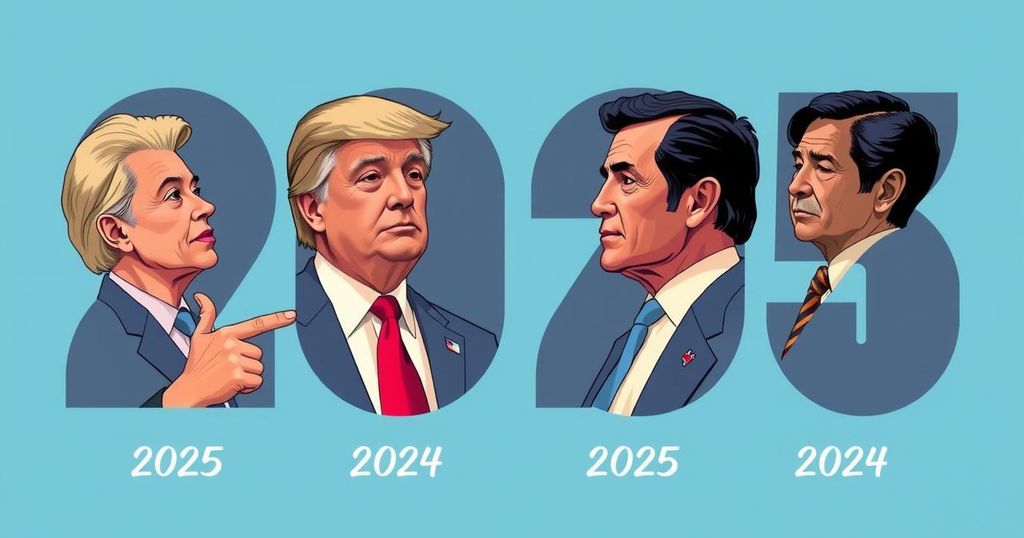World news
ALEH HAIDUKEVICH, ASIA, BELARUS, CANADA, ELECTION, ELECTIONS, EUROPE, HANNA KANAPATSKAYA, LIBERAL DEMOCRATIC PARTY, LITHUANIA, NORTH AMERICA, OPPOSITION, PHILIPPINES, POLITICS, PRESIDENTIAL ELECTION, PRESIDENTIAL ELECTIONS, REPUBLICAN PARTY OF LABOR AND JUSTICE, SCHOOL OF INTERDISCIPLINARY GLOBAL STUDIES, SIARHEI SYRANKOU, TA, TATSIANA KULAKEVICH, UNIVERSITY OF SOUTH, UNIVERSITY OF SOUTH FLORIDA
Daniel O'Connor
0 Comments
Key Global Elections to Watch in 2025: Implications and Insights
In 2025, key elections in Belarus, Germany, the Philippines, Canada, and Chile will unfold, reflecting pressing global issues like inflation and populism. Each country’s political landscape presents unique challenges and significant implications, as analyzed by experts. These elections promise to shape domestic policies and international relations, underscoring the importance of electoral integrity and governance in a complex global environment.
The year 2025 will witness critical elections in various global regions, despite it not rivaling the election fervor of 2024. Voters in Belarus, Germany, the Philippines, Canada, and Chile will confront pressing issues such as inflation, the rise of populism, and geopolitical conflicts. Expert analyses reveal that these elections will shape the domestic and international landscapes of these respective nations, with significant implications for governance and policy direction.
In Belarus, Alexander Lukashenko seeks re-election on January 26, 2025, despite lacking genuine opposition. The climate does not favor a democratic process, as the government continues to suppress dissent following the 2020 protests. Without the ability for expatriates to cast their votes and with widespread political repression, another term for Lukashenko would likely consolidate Belarus’s ties to Russia, impacting regional stability.
Germany faces an unexpected federal election on February 23, 2025, precipitated by the collapse of Chancellor Olaf Scholz’s coalition government. With dismal approval ratings and a struggling economy exacerbated by external pressures like the Ukraine war and competition from China, Scholz’s Social Democrats may falter against the rising Christian Democratic Union led by Friedrich Merz. The election will test Germany’s political stability amidst challenging circumstances.
In the Philippines, midterm elections on May 12, 2025, will nominate local officials and senators, serving as a referendum on President Ferdinand Marcos Jr.’s governance. His capacity to regain control over both the senate and the political narrative is crucial, especially amid potential threats from Vice President Sara Duterte’s ambitions. The outcome could significantly influence Marcos’s political survival and the ongoing dynamics within Philippine politics.
Canada is poised for a possible early federal election before October 20, 2025, as Prime Minister Justin Trudeau grapples with declining popularity and the fragility of his coalition government. The opposition, led by Pierre Poilievre, has gained traction amid public dissatisfaction with inflation and policy directions. This election could redefine Canada’s political landscape, determining whether Trudeau maintains his vision or a conservative resurgence ensues, reflecting a broader shift in voter sentiment.
Lastly, Chile’s presidential election on November 16, 2025, arises within a context of socio-political turbulence, marked by the rejection of two proposed constitutions. The election, likely proceeding to a runoff, will determine the path forward as the country seeks stability after years of upheaval. With the ruling coalition facing challenges in presenting a viable candidate against the opposition, the outcome will have enduring consequences for Chilean governance and reform.
The article highlights the anticipated elections in five nations in 2025: Belarus, Germany, the Philippines, Canada, and Chile, emphasizing the socio-economic and political challenges each country faces. These elections encapsulate key themes such as inflation, populism, and the impacts of international conflicts, particularly the war in Ukraine. Analysis from political experts provides insights into each election’s unique context and potential outcomes, underscoring the importance of these electoral processes in shaping future governance and policy-making in these regions.
The significant elections set for 2025 in Belarus, Germany, the Philippines, Canada, and Chile are reflective of each nation’s unique political landscape and the broader challenges they confront. Whether it is the autocratic hold of Lukashenko in Belarus, the coalition struggles in Germany, the political maneuvering in the Philippines, Trudeau’s leadership in Canada, or the constitutional impasse in Chile, the outcomes will likely have profound implications for governance and policy directions moving forward. Observers should remain vigilant as these elections unfold, shaping the future of these nations and their interactions on the global stage.
Original Source: theconversation.com




Post Comment